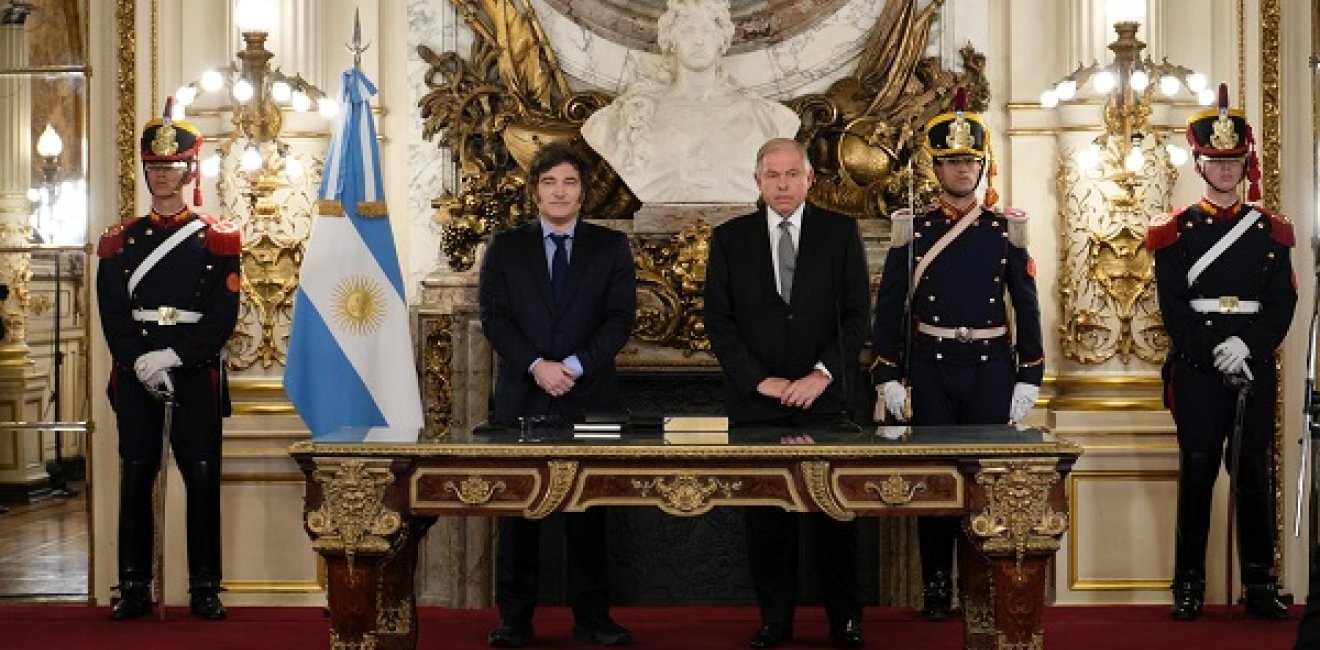
A blog of the Latin America Program
Argentine President Javier Milei, who promised during his campaign to take a “chainsaw” to the state, is turning his attention to his country’s diplomatic establishment. On October 30, he abruptly replaced Foreign Minister Diana Mondino with businessman Gerardo Werthein, his ambassador in Washington. His action reflects a broadening of his agenda, from dramatically shrinking government to putting his hard right imprint onto foreign policy and deepening Argentina’s alignment with Washington.
Mondino’s departure was triggered by Argentina’s vote in favor of an annual resolution at the UN General Assembly condemning the US embargo of Cuba, which apparently came as a surprise to Milei. Argentina has long supported this resolution, which passes nearly unanimously. Its position reflects longstanding practice and an interest in assuring continued approval for an annual resolution calling on Britain to negotiate over the Falkland (Malvinas) Islands. Milei was clearly unpersuaded by that logic; he would have preferred Argentina to join the only two “no” votes, from the United States and Israel.
Though Mondino’s public dismissal was sudden, it was not entirely unexpected. Since Milei took office last December, he has leaned heavily on his sister, Karina, his chief of staff, and senior adviser Santiago Caputo. Mondino, by contrast, has seen her portfolio shrink. Argentina’s export and investment promotion agency, for example, moved from the Foreign Ministry to the Casa Rosada presidential palace.
Though Mondino’s public dismissal was sudden, it was not entirely unexpected having seen her portfolio shrink.”
Other than the vote on the Cuban embargo, Mondino, a conservative economist, did not appear to resist the conservative direction of Argentine foreign policy under Milei, who in recent months has denounced the UN “Agenda 2030” development goals and “Pact for the Future” as examples of “collectivism and moral posturing.”
But as foreign minister, Mondino had the unenviable role of cleaning up after Milei, who has the habit of traveling overseas to meet with conservative opposition figures. He has alienated several of his counterparts, including President Luiz Inácio Lula da Silva of Brazil, Gustavo Petro of Colombia, and Pedro Sánchez of Spain. The diplomacy required to mend relations might not have endeared her to Milei and his combative and ideological entourage.
Mondino’s removal, meanwhile, prefigured a broader shakeup at the Palacio San Martín. Her replacement, Werthein, one of Argentina’s wealthiest businessmen, swiftly dismissed senior leaders. More changes are to come. Now that Milei has turned his attention to the Foreign Ministry, he is pursuing an “audit” of the decision-making process to identify “enemies of liberty” and “traitors.” That has provoked fears of a “purge” in the ministry.
Now that Milei has turned his attention to the Foreign Ministry, he is pursuing an ‘audit’ of the decision-making process to identify ‘enemies of liberty’ and ‘traitors.’”
Even more ominously for Argentina’s career diplomats, Milei is floating an organizational change that would reduce staff and benefits. Today, Argentine ambassadors make as much as $220,000 per year in a country where the average income is around $4,500. Closing several embassies is also under consideration, a change that diplomats say would inhibit efforts to promote Argentine exports.
As a democratically elected leader, Milei has every right to expect Argentine foreign policy to reflect his views. And aligning with the United States may be helpful at the International Monetary Fund, where the United States has a 17.42% voting share. But whether Argentine political support at the United Nations on issues such as Cuba is reciprocated by the United States at the IMF remains to be seen. In the meantime, Milei risks politicizing Argentine diplomacy at a moment of heightened global and regional uncertainty.
Author

Former member of the Senior Foreign Service of the U.S. Department of State

Argentina Project
The Argentina Project is the premier institution for policy-relevant research on politics and economics in Argentina. Read more


Latin America Program
The Wilson Center’s prestigious Latin America Program provides non-partisan expertise to a broad community of decision makers in the United States and Latin America on critical policy issues facing the Hemisphere. The Program provides insightful and actionable research for policymakers, private sector leaders, journalists, and public intellectuals in the United States and Latin America. To bridge the gap between scholarship and policy action, it fosters new inquiry, sponsors high-level public and private meetings among multiple stakeholders, and explores policy options to improve outcomes for citizens throughout the Americas. Drawing on the Wilson Center’s strength as the nation’s key non-partisan policy forum, the Program serves as a trusted source of analysis and a vital point of contact between the worlds of scholarship and action. Read more

Explore More in Weekly Asado
Browse Weekly Asado
Dengue Haunts South America’s Summers

Lessons from Costa Rica’s Economic Transformation

Women and Latin America’s Digital Revolution

